Related Research Articles
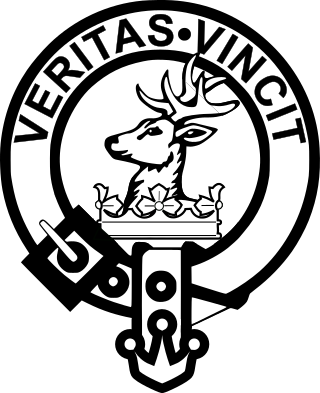
Clan Keith is a Highland and Lowland Scottish clan, whose Chief historically held the hereditary title of Marischal, then Great Marischal, then Earl Marischal of Scotland.

The title of Earl Marischal was created in the Peerage of Scotland for William Keith, the Great Marischal of Scotland.
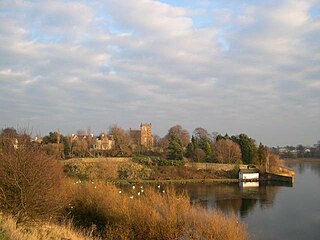
Duddingston is a historic village in the east of Edinburgh, Scotland, next to Holyrood Park.

Donnchadh was a Gall-Gaidhil prince and Scottish magnate in what is now south-western Scotland, whose career stretched from the last quarter of the 12th century until his death in 1250. His father, Gille-Brighde of Galloway, and his uncle, Uhtred of Galloway, were the two rival sons of Fergus, Prince or Lord of Galloway. As a result of Gille-Brighde's conflict with Uhtred and the Scottish monarch William the Lion, Donnchadh became a hostage of King Henry II of England. He probably remained in England for almost a decade before returning north on the death of his father. Although denied succession to all the lands of Galloway, he was granted lordship over Carrick in the north.

Sir John Keith, 1st Earl of Kintore PC (Scot), was a Scottish nobleman.
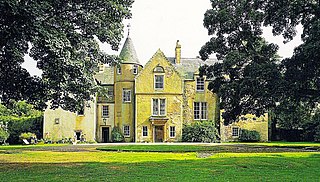
Keith Marischal is a Scottish Baronial Country house lying in the parish of Humbie, East Lothian, Scotland. The original building was an "L-shaped" Tower house, built long before 1589 when it was extended into a "U-shaped" courtyard house. The building acquired its modern appearance in the 19th century when the courtyard was filled in. The house is protected as a category B listed building.
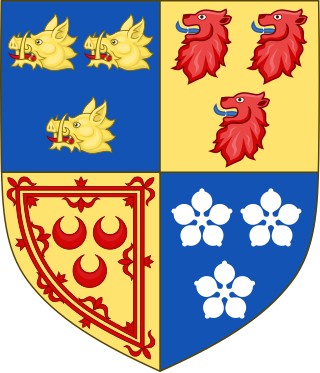
Alexander Seton, 1st Earl of Huntly, who adopted the family name of Gordon from about 1457, was a powerful 15th-century Scottish magnate. He was knighted in 1439/1440 and was Lord of Badenoch, Gordon, Strathbogie and Cluny.

George Keith, 5th Earl Marischal (c. 1553–1623) was a Scottish nobleman and Earl Marischal. He succeeded as earl on 7 October 1581, upon the death of his grandfather, William Keith, 4th Earl Marischal.
Archibald of Douglas was a Scottish nobleman. He was the son of William of Douglas.
William of Douglas was a medieval nobleman living in Clydesdale, an area under the control of the King of the Scots.
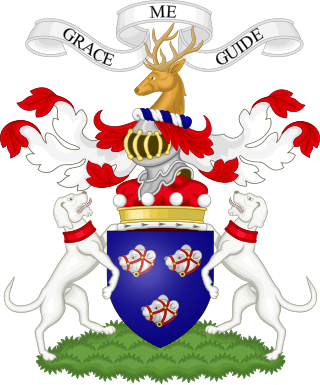
Clan Forbes is a Highland Scottish clan from Aberdeenshire, Scotland.
Thor of Tranent, also known as Thor, son of Sveinn or Thor, son of Swain, Lord of Tranent and Sheriff of Lothian, was a landlord and chieftain active in Lothian in the reign of King David I of Scotland. He is attested in a large number of charters during King David's reign in Lothian, both as a charter witness on charters granted by other patrons and on charters he himself issued. His name appears either as Thor son of Sveinn or "Thor of Tranent", the latter appellation deriving from his ownership of the "barony" of Tranent, East Lothian, lands including a wide area around the modern town, including, for instance, Prestonpans.

Baron of Plenderleith is an ancient title of nobility in the Baronage of Scotland.
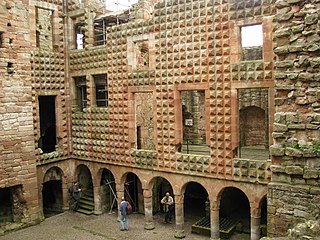
Francis Stewart, 5th Earl of Bothwell, was Commendator of Kelso Abbey and Coldingham Priory, a Privy Counsellor and Lord High Admiral of Scotland. He was a notorious conspirator who led several uprisings against his first cousin, King James VI, all of which ultimately failed, and he died in poverty in Italy after being banished from Scotland. Francis's maternal uncle, the 4th Earl of Bothwell, was the chief suspect in the murder of James VI's father, Lord Darnley.

William Keith, 4th Earl Marischal was a Scottish nobleman and politician.

Sir Edward Keith was a Scottish nobleman and hereditary 11th Marischal of Scotland.
Elizabeth Gordon, Heiress of Gordon, Scottish baroness and progenitress of the Gordon Earls and Marquesses of Huntly.
Sir John de Keith, Marischal of Scotland, was a Scottish noble. He was a son of Hervey de Keith and Margaret de Douglas.
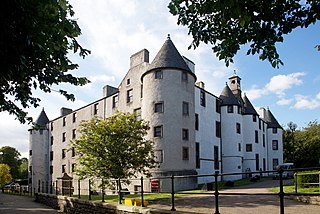
James Scrimgeour Scottish landowner and Constable of Dundee.
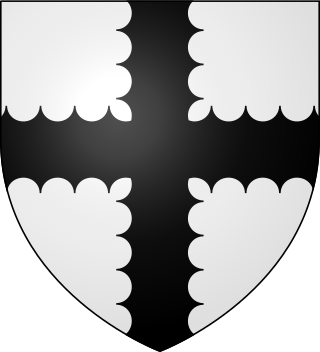
William St. Clair, 6th Baron of Roslin was a Scottish nobleman of the late 13th century.
References
Notes
Sources
- Balfour Paul, Sir James Scots Peerage IX vols. Edinburgh 1905.
- Nisbet, Alexander, A system of Heraldry: &c.II vols. Edinburgh 1816.
- Liber S. Marie de Calchou : registrum cartarum abbacie tironensis de Kelso, 1113-1567,II vols. Bannatyne Club, Edinburgh 1846.